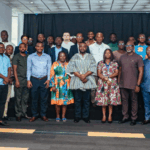
India’s successful pivot to high-tech manufacturing offers a masterclass in industrial policy for countries in the Global South.
Western nations, led by the United States, are actively cultivating India as a strategic counterweight to China and Russia and BRICS Plus Nations. This strategy is twofold: offering substantial trade and manufacturing incentives to integrate India into Western supply chains, while simultaneously attempting to limit its reliance on other partners, particularly through efforts to dissuade purchases of Russian crude oil. However, this has revealed the limits of Western influence. India has demonstrated strategic pragmatism, accepting the economic benefits of Western alignment in technology and manufacturing while steadfastly protecting its own energy security interests by continuing to buy Russian oil. This delicate balancing act highlights a new paradigm where emerging powers can engage with competing blocs on their own terms, leveraging global rivalries to their national advantage.
This sophisticated geopolitical maneuvering has yielded tangible industrial results for India, perfectly illustrated by India’s electronics manufacturing boom.
India’s Electronics Manufacturing Boom
In a remarkable transformation, India has ascended to become the third-largest producer of iPhones globally by 2025, trailing only behind China and Vietnam in production volume. This shift, propelled by a surge in ‘Made-in-India’ iPhones, has not only elevated India’s electronics sector to the third spot in the country’s export rankings but also positioned it as a key player in the global supply chain. With over 20% of global iPhone production now originating from India, this development offers valuable insights for African nations grappling with industrialisation challenges, particularly Nigeria and South Africa as Africa powerhouses.
How India Achieved This Milestone.
At the heart of this boom is Apple’s strategic expansion into India. The tech giant has exported iPhones worth a record $10 billion in the first six months of the 2025 financial year, accounting for over 75% of India’s smartphone exports ($13.4 billion) and 45% of overall electronics shipments. Production value has skyrocketed from $2 billion in the 2022 financial year to $22 billion in the 2025 financial year, underscoring India’s role as Apple’s second-most important manufacturing base after China. This has resulted in more than a fifth of global iPhone sales coming from Indian factories, with shipments exceeding 20 million units in the first half of 2025 alone.
India’s journey in electronics exports is nothing short of meteoric. From ranking seventh in the 2022 financial year, the sector climbed to third place by the 2025 financial year, surpassing established giants like gems and jewellery, chemicals, drugs and pharmaceuticals, and readymade garments. In the first half of the 2025 financial year, electronics exports soared 42% year-on-year to $22.2 billion, making it the fastest-growing category among India’s top 30 exports. Over the past three years, exports have grown 63%, from $23.5 billion in the 2023 financial year to $38.5 billion in the 2025 financial year, with projections suggesting a doubling by the 2026 financial year if trends persist.
Why the Shift Diversification, Geopolitics, and Incentives
Several factors have converged to fuel this growth.
· Global Supply Chain Diversification: Foremost is the global push to diversify supply chains away from over-reliance on China as a single manufacturing hub. Amid ongoing geopolitical tensions, companies like Apple are mitigating risks by expanding operations to alternative locations such as India and Vietnam.
· Supportive Geopolitics: Western nations, led by the United States, are actively cultivating India as a strategic counterweight to China and Russia. This strategy involves offering trade incentives to integrate India into Western supply chains, while simultaneously discouraging its reliance on other partners.
· Targeted Government Incentives: The Production-Linked Incentive (PLI) scheme for smartphones has attracted massive investments by offering financial rewards for increased production and exports, drawing in manufacturers like Foxconn, Pegatron, and Tata.
· Political Will and Leadership: The personal commitment and active diplomacy of Prime Minister Narendra Modi have been crucial in courting global tech giants and driving policy implementation, creating a cohesive national manufacturing strategy.
· Demographic Leverage: India has strategically leveraged its vast population through initiatives focusing on skill development and vocational training, creating a skilled workforce for high-tech manufacturing.
Lessons for Africa: Turning Population and Resources into Industrial Strength
India’s success in closing the gap in the electronics sector serves as a blueprint for African countries striving to position themselves globally.
Nigeria: Harnessing Africa’s Largest Population as Human Capital
As Africa’s most populous nation with over 200 million people, Nigeria mirrors India’s demographic advantage but has yet to fully capitalise on it. The country’s manufacturing sector contributes only 9.62% to GDP in the first quarter of 2025, a decline amid challenges like poor infrastructure, skills shortages, and an unsustainable business environment defined by policy inconsistency and regulatory hurdles. Like India, Nigeria could shift its youthful population into productive capital by investing in education and vocational training, but these efforts will continue to fail unless fundamental issues of governance and infrastructure are addressed.
South Africa: Reversing Deindustrialisation Legacy Issues
South Africa, Africa’s most industrialised nation, maintains its top spot as Africa manufacturing hub despite dealing with the consequences of past disastrous eras characterised by lack of proper planning, mismanagement and corruption. While the country is now emerging from these challenges with improved energy stability and governance reforms, the legacy of these issues continues to affect manufacturing competitiveness. The historical mismanagement of state-owned enterprises and infrastructure decay still weighs on industrial growth, even as current reforms show promising signs of recovery.
What India’s Rise Means for a Struggling Africa
As India solidifies its electronics dominance, Africa’s projected economic growth presents opportunities amid challenges. India’s model shows that combining government incentives, geopolitical savvy, and strong political will can propel a nation from laggard to leader.
For the African context, this is a profound lesson. It also illustrates that navigating geopolitical competition is not about choosing sides, but about strategically engaging with all parties to maximise national interest. African nations like Nigeria and South Africa can learn from this, recognising that their own resources and strategic positions hold value that can be leveraged to secure favourable terms and maintain policy sovereignty, rather than being mere subjects of external influence especially as it relates to trade.
The author is Chairperson of South Africa based The Centre for Alternative Political and Economic Thought.
- President Commissions 36.5 Million Dollars Hospital In The Tain District
- You Will Not Go Free For Killing An Hard Working MP – Akufo-Addo To MP’s Killer
- I Will Lead You To Victory – Ato Forson Assures NDC Supporters
Visit Our Social Media for More




